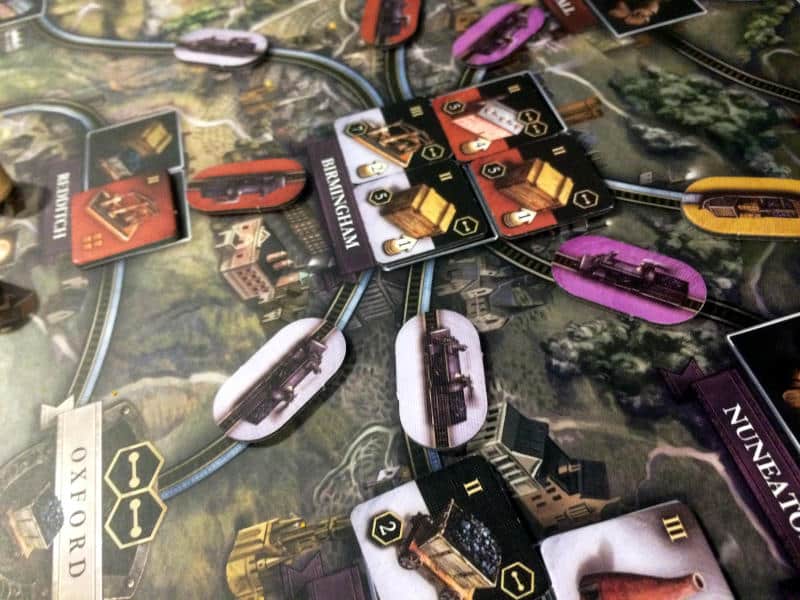Recently at work, we discussed how constantly going from one task to the next or changing from one tool to another is rather draining. This so-called context switching has been shown to reduce productivity. That’s when it struck me that some board games suffer from exactly this problem. So in this article, I want to look at how research into the problems of context switching could potentially be applied to board game design.
Definitions
Let me start by defining what I mean by “context switching” and how it differs from what we usually understand by “multi-tasking”. Hopping from one task to another is quite normal. In a board game, you expect to have to do or at least consider several things at once on each of your turns.
Doing several things that are all related is what I would call multi-tasking. You can easily consider multiple choices in a game as long as they’re relatively similar. Deciding which action space is best while working out if you have enough resources to do what you want to do and at the same time keeping an eye on what other players might be planning is a form of multi-tasking. It can sometimes be a bit overwhelming, but it’s usually manageable.
Context switching is a bit different though. You’re still doing several things at once, but they are very different things. In board game terms, imagine having to go through clean-up steps, where you total up points scored this round, shuffle discard piles into new draw decks and remove certain tiles, depending on the current round, while also having to make a choice about what action you should take next. All of these things are not really related and will quickly become overwhelming.
Or consider being the person who is teaching the rules, while also having to play. Not many can do both effectively at the same time. I think many of us will have been there. People asking you rules questions can easily distract you and let you forget what you were planning to do on your turn. It gets especially confusing when you have to look up the answers in the rulebook. Now you will have completely lost your thread.
The Problem of Context Switching
So, context switching is definitely problematic. Games that require players to do lots of different things or choose between options that are very dissimilar will become overwhelming pretty quickly. There are plenty of games where a single turn consists of many different phases. Player aids can be very helpful here, but they are really just a crutch to address a problem in the game’s design. People will still be distracted when they have to check what phase comes next and what they have to do. Granted, many games with multiple phases in a single turn do tend to flow after a few rounds, but it’s still not elegant.
Another form of context switching in games is to do with housekeeping steps between rounds or at certain times in a game. It’s at these points in a game that the rulebook often comes out, because nobody can remember what needs to be done. Again, a quick reference guide can help here, but ultimately it’s still a form of context switching. Players have worked out their winning strategy and now have to think about something completely different.
Now, I’m not saying that games with context switching are badly designed. It’s quite possible that removing phases destroys the overall game experience. Sometimes breaking a turn into multiple steps can actually be helpful. All I’m saying is that any sort of context switching can become problematic and needs to be carefully considered. At the end of the day, I think some games that are seen as complex, difficult or maybe heavy have that image because of the amount of context switching.
Examples
As an example, I immediately think of 18xx games. They are often seen as difficult to learn. I reckon some of that perception is due to the various phases. There is the stock and an operating round. The operating round is further divided into laying track, operating locomotives and buying and selling locomotives. Turn order also changes from time to time. There are a lot of different things going on that players have to remember when they play an 18xx game. It’s this kind of housekeeping that can put people off.

The wonderful Brass: Birmingham is another case in point. Taking a turn can be difficult enough, given the number of options players have to consider. However, once everyone has taken their turn, it’s time to decide turn order for the next round. Adding up poker chips and moving player tokens around isn’t particularly hard. It’s quite simple arithmetic. Yet, it’s enough of a distraction to get players out of the flow of the game. Then, halfway through the game, you score everything, remove tiles from the board and get ready for the next era. Again, it’s not difficult, but it’s another moment of context switching in the game.
Contrast these with Tapestry. There are a few actions that I would consider a form of context switching. Rolling the dice when you carry out a conquer or a research action, as well as placing income buildings or landmarks are all quite different to what you usually do on a turn. Yet, these are things that you often do while the next player already takes their turn. So you can take your time making a decision without stopping the flow of the game. You will also have time to switch back to thinking about your next turn.
What About You?
So what do you think about context switching in board games? Can you think of other examples? Are there games that were re-designed to remove this break in flow? Have you played any games where context switching actually enhanced the gameplay experience? As always, please share your thoughts and experiences in the comments below. I’d love to hear from you.
Keeping the blog running takes time and resources. So if you can chip in, that would be amazing.
Useful Links
- Brass: Birmingham review: https://tabletopgamesblog.
com/ 2023/ 04/ 01/ brass-birmingham-deluxe-saturday-review/ - Tapestry review: https://tabletopgamesblog.
com/ 2019/ 11/ 09/ tapestry-saturday-review/
Audio Version
Intro Music: Bomber (Sting) by Riot (https://www.
The following music was used for this media project:
Music: Chill Lofi by Ramol
Free download: https://filmmusic.io/song/6788-chill-lofi
License (CC BY 4.0): https://filmmusic.io/standard-license


